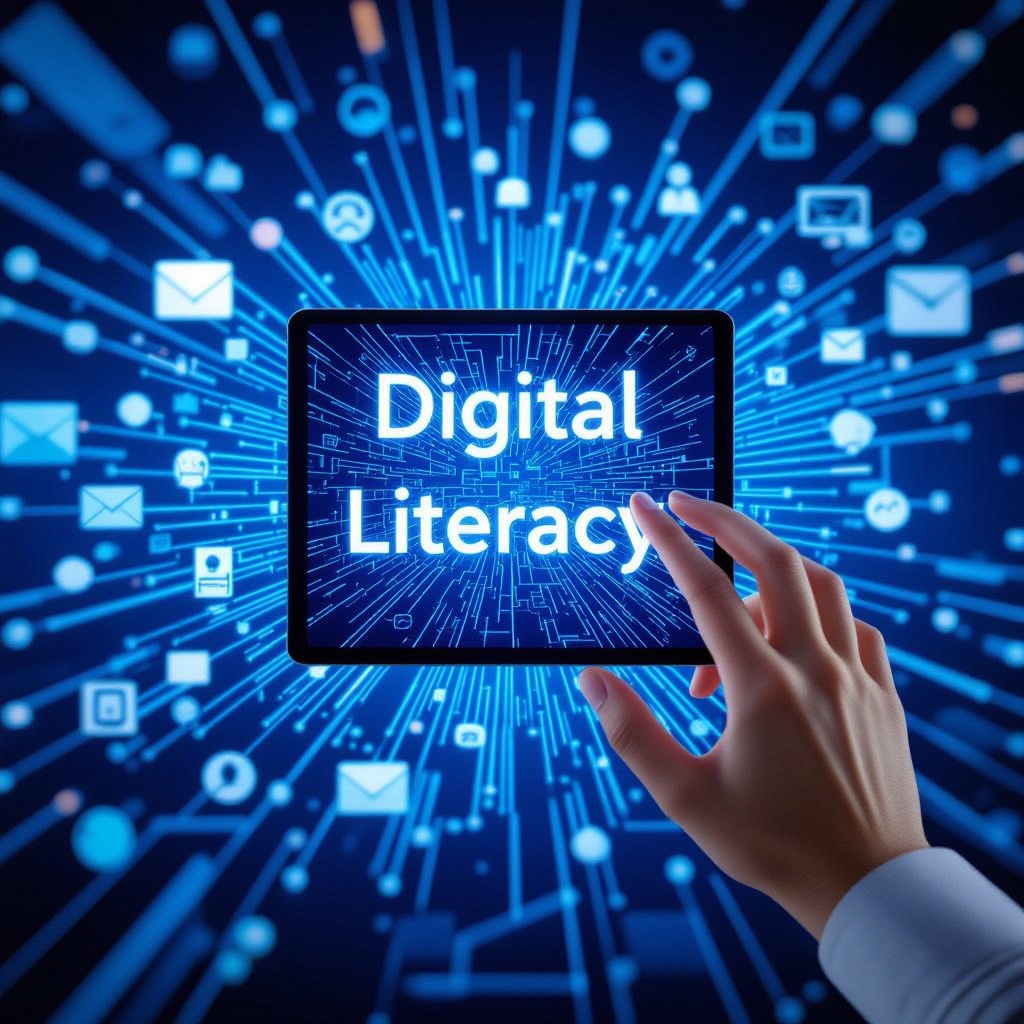Qatar’s push for digitalization anticipates achieving 99% internet penetration by 2025, making it critical for students to acquire necessary digital literacy skills. This surge in connectivity demands more than just access to information. It requires mastering critical digital skills to ensure safe and successful online interactions.
Key Takeaways
- With Qatar’s digital infrastructure advancing rapidly, students need to build digital literacy skills to make the most of available resources.
- Competency in online research and evaluating information is crucial for identifying credible sources and steering clear of misinformation.
- Digital collaboration and communication tools are becoming essential in education, preparing students for future digital careers.
- New technologies like AI require students to efficiently adapt and innovate within a tech-forward environment.
- Focusing on digital citizenship ensures students engage responsibly and protect themselves in an increasingly online world.
Introduction to Digital Literacy in Qatar
With an impressive 99% internet penetration by 2025, Qatar boasts 3.05 million active internet users. This widespread connectivity offers students incredible access to information but also presents challenges like misinformation. Digital literacy becomes crucial for students wanting to make the most of these resources.
By understanding digital skills, students in Qatar aren’t just preparing for careers requiring tech-savvy minds, they’re also navigating everyday online interactions safely and effectively. It’s important to bolster these skills for a future where digital tools are part of our daily lives. For those keen to dive deeper, resources like the United Nations Digital Library offer insights into the global impact of digital advancements.
Equipping students with digital education ensures they’re prepared for whatever this digitally-driven future may hold. Whether emphasizing safe social media practices or promoting critical thinking, digital literacy prepares the youth for tomorrow’s online world.

The Art of Online Research and Information Evaluation
In Qatar, where median mobile download speeds soar to 358.27 Mbps and fixed internet speeds reach 184.54 Mbps, students have unmatched access to global information. But accessing it isn’t enough; students must hone digital literacy skills to use it wisely. This begins with mastering search engine strategies. Knowing how to use advanced search operators can save time and enhance research quality, enabling students to filter through the vast sea of data efficiently.
Critical thinking comes into play when evaluating source credibility. Not everything found online is trustworthy. Students should check the author’s credentials, publication date, and cross-reference information with other reputable sources. Developing these media literacy skills helps in discerning fact from opinion.
Misinformation detection is another crucial component. With the rapid spread of false information, understanding the signs of fake news is essential. Factors such as sensational headlines, lack of supporting evidence, or emotional appeals often flag misinformation. According to recent studies, content sharing and misinformation rates continue to rise, making these skills more important than ever. Source.
Remember, effective online research and a critical eye can transform the overwhelming flow of data into a fountain of reliable knowledge. Embrace these skills for a sharper, smarter approach to information gathering.
Fostering Collaboration and Communication in the Digital Sphere
In Qatar, digital collaboration tools are becoming vital for students. The e-learning management system market is expected to reach $1.66 billion by 2025 (Source: Market Watch), highlighting the increasing significance of these tools. Students make use of platforms like Microsoft and Google Cloud, enhancing their ability to communicate effectively in this digital space.
Recent nationwide initiatives highlight virtual classrooms and group projects. Schools adopt these methods to ensure students work together efficiently and develop important communication skills. These initiatives include:
- The use of virtual classrooms for interactive learning experiences.
- Collaborative group projects that promote teamwork and digital proficiency.
These programs aim to prepare students to thrive in a digitally connected world. More information about virtual classrooms and online collaboration can be found on Edutopia. Embracing these advances, students now find themselves ready to conquer increasing digital demands with ease.
Harnessing Digital Content Creation
Qatar’s educational landscape is embracing digital creativity by integrating game-based learning and gamification into its curricula, making digital content creation an essential skill for students. By engaging with these technologies, students can enhance their multimedia presentation skills, learn digital storytelling, and master design software.
Students are encouraged to craft multimedia presentations that effectively communicate their ideas, integrating elements like video, audio, and graphics. Digital storytelling also plays a crucial role, allowing students to weave narratives using digital media tools. This skill not only boosts creativity but also aids in developing a deeper understanding of narrative structures and audience engagement.
Design software is yet another pillar, offering students the chance to bring their creative visions to life. Mastering tools like Canva or Adobe Spark can significantly enhance a student’s ability to produce visually appealing content.
Qatari curricula actively incorporate these technologies, creating modern, tech-rich learning environments. For instance, many schools use platforms like Kahoot and Quizizz in gamification, transforming traditional lessons into interactive sessions. This shift not only engages students more effectively but equips them with skills that are increasingly valuable in today’s digital-focused job market. Resources such as EdTech Magazine highlight the broader benefits of these educational technologies.
As Qatar continues to evolve its educational strategies, students will find themselves increasingly immersed in a tech-savvy environment. Embracing these changes can lead to a significant shift in how students create and interact with digital content.

Promoting Responsible Technology Use and Digital Citizenship
Digital literacy in Qatar is intertwined with the country’s National AI Strategy and Vision 2030 goals. These initiatives aim to cultivate productive e-learners enriched with strong digital citizenship values. There’s a noticeable gap in technology skills despite these efforts. To bridge this, several initiatives focus on promoting online privacy, awareness of cyberbullying, and the responsible use of technology.
Qatar’s strategic plans place a premium on fostering these essential digital citizenship values. Here are a few key initiatives:
- Creating awareness campaigns about online privacy to help students protect their personal information.
- Implementing educational programs addressing cyberbullying to foster a supportive online community.
- Encouraging responsible technology use through school-led digital ethics courses.
Global trends illustrate challenges in digital safety and ethical online conduct. Countries worldwide grapple with issues like data breaches and cyber harassment, underscoring the need for solid ethics in digital interactions. Qatar isn’t alone in these efforts; international benchmarks, such as Google’s Be Internet Awesome program, can offer guidance.
Emphasizing digital citizenship isn’t just about addressing immediate concerns. It’s about preparing students for a future where digital interactions govern significant aspects of life, from education to employment. By equipping students with these skills, Qatar is ensuring its young population is not only competent but also conscientious digital citizens. For more on global efforts in digital citizenship, check out resources from initiatives like Common Sense Media.

Adapting to Emerging Technologies
Qatar’s AI sector, valued at a hefty QR2bn ($549 million), shines a spotlight on the country’s dedication to embracing AI and associated technologies. As students, honing skills in using AI tools and becoming familiar with cloud platforms becomes essential. But it’s not all about using AI tools; being flexible and ready to catch new tech trends can make a real difference.
Educational programs such as hackathons and events like QSTP’s AI Week play crucial roles. These initiatives provide students with valuable exposure to real-world applications, setting the stage for adaptive learning and innovation.
Key skills to keep in mind include:
- Understanding and utilizing artificial intelligence tools
- Gaining proficiency in cloud computing
- Staying current with emerging technology
Check out resources like TechCrunch or the European Union’s Digital Education Action Plan for more on how these skills shape future-ready education initiatives.

Frequently Asked Questions
🌐 Why is digital literacy so important for students in Qatar?
With Qatar nearing 99% internet penetration by 2025, students now access a vast online world filled with both opportunities and risks. Digital literacy equips them to navigate, analyze, and use online resources effectively while steering clear of misinformation. In an increasingly tech-driven society, it’s essential for lifelong learning and career readiness.
🧠 How can students improve their online research and fact-checking skills?
To become smarter digital citizens, students in Qatar should master search engine strategies like using filters and advanced operators. They also need to evaluate source credibility by checking authorship, dates, and cross-referencing information. This not only boosts academic research but also helps combat the rising tide of fake news.
👩💻 What role do collaboration tools play in Qatari classrooms?
Digital collaboration platforms like Microsoft Teams and Google Cloud are transforming learning environments in Qatar. These tools enable group projects, virtual classrooms, and real-time communication, fostering teamwork and digital fluency. With the e-learning market booming, mastering these tools prepares students for future academic and career challenges.
🎨 How are Qatari students learning to create digital content?
Through initiatives like game-based learning and digital storytelling, students are encouraged to build multimedia skills. By using tools like Canva and Kahoot, they learn to craft engaging presentations and stories that boost creativity and digital confidence. This hands-on approach supports Qatar’s shift toward a more tech-enhanced education system.
🛡️ What is digital citizenship and why does it matter in Qatar?
Digital citizenship involves using technology responsibly and ethically, a key part of Qatar’s Vision 2030. Students learn about online privacy, cyberbullying prevention, and proper digital conduct to become respectful online participants. These skills help create a safe and supportive virtual environment for all.
🤖 How is Qatar preparing students for emerging technologies like AI?
Qatar is investing in its AI sector and encouraging students to explore artificial intelligence, cloud computing, and tech innovation through hackathons and events. These programs promote adaptability and prepare youth for a future where new technologies shape education and employment. Staying current with tech trends has never been more vital.
Sources:
Digital 2025: Qatar – DataReportal
Qatar E-Learning Management System Market – Mordor Intelligence
ICT Innovation: Early Adoption in Qatar – Oxford Business Group
(Sci-Hub and Archive Market Research sources are not listed as they are not appropriate for the request)
SAMENA Daily News
EdTech in Qatar Sparks 7 Powerful Classroom – Gulf Magazine
